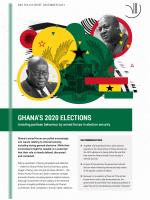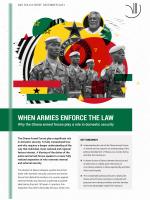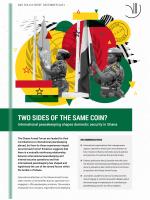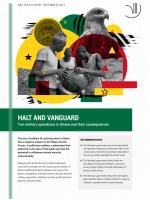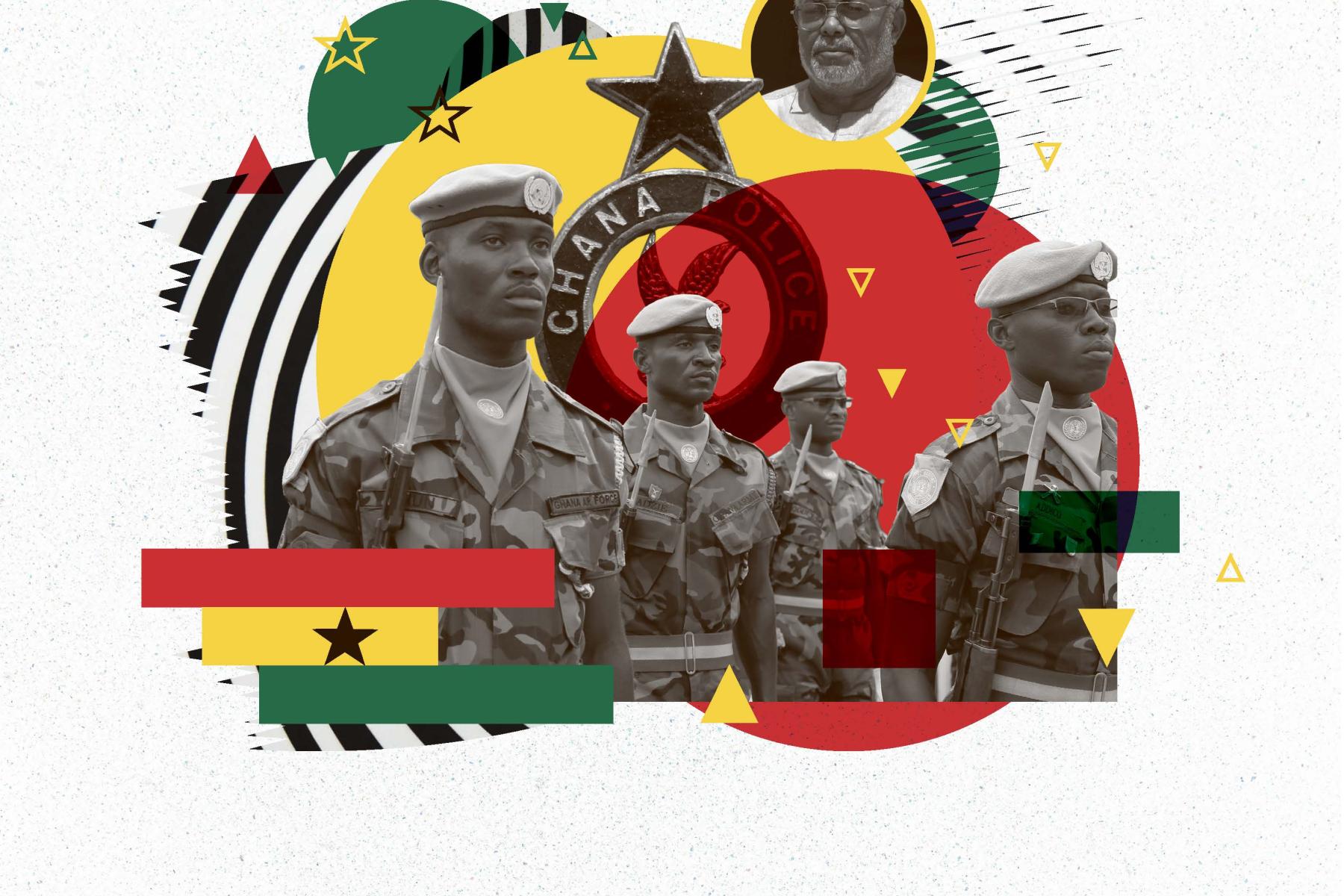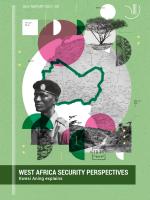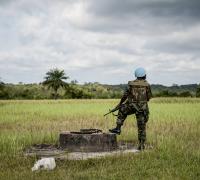Ghana's 2020 elections
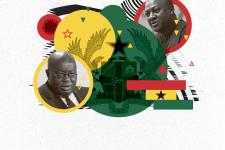
- Together with experiences from other internal operations, the Government of Ghana should use the 2020 elections to clearly define the role that they want the Ghana Armed Forces to play in internal security.
- As part of this exercise, the government should discuss what militarising internal security means in the specific context of Ghana.
- Because it is a question of how not if the armed forces have a role to play during elections, the government should refrain from deploying soldiers in ways that can be interpreted as politically motivated.
Ghana’s armed forces are pulled increasingly into issues relating to internal security, including during general elections. While their involvement might be needed, it is essential that their role is clearly defined, discussed and contained.
With a reputation of being competent and effective – unlike the Ghana Police Service that has a public image of being more corrupt and less efficient – the Ghana Armed Forces are used to address complex domestic threats, including election-related violence.
Although involvement of the military in the electoral process is legally justifiable according to Ghana’s constitution, their complicity in human rights violations and risk of politicisation have led to political and civil- military tensions. More importantly, their involvement has raised concerns about the government’s preference for military solutions to challenges surrounding the electoral process in Ghana.
Tensions around the election challenged the police
The 2020 elections tested Ghana’s democratic resilience. They occurred during the COVID-19 pandemic as well as heightened political tension. President Nana Akufo-Addo of the New Patriotic Party (NPP) competed against former President John Mahama, the candidate of the main opposition party, the National Democratic Congress (NDC), for the third consecutive time.
As the only former president since 1993 to lose power after one term, Mahama, who served from 2012-2017, was determined to win, resulting in rising political friction during all phases of the electoral process.
The Armed Forces shall be equipped and maintained to perform their role of defence of Ghana as well as such other functions for the development of Ghana as the President may determine.
Another source of tension was the Election Commission’s decision to implement a new voter register in 2020. Apart from risking people’s health, because registering took place during the pandemic, doing so led to heightened tension and violent clashes between NPP and NDC supporters over concerns that the process would be manipulated by the NPP government.
This caused many to speculate whether the police could guarantee election security against the backdrop of other unresolved challenges such as general distrust in the Election Commission, political vigilantism, unchecked abuse on social media such as hate speech, and secessionist activities in the Volta Region, an NDC stronghold.
The involvement of the Ghana Armed Forces in electoral processes over the years has been a delicate subject which some members of the general public have expressed reservations about.
Internal security falls within the Ghana Police Service’s mandate. However, due to constraints on the police, other security agencies are brought in to complement its efforts during elections under the framework of the National Election Security Task Force, an ad hoc security arrangement set up before elections take place. In theory, the police are leading the operation, with support from other security agencies, such as the Ghana Armed Forces.
The National Election Security Task Force exists at the national, regional and district levels with membership from the police, armed forces, electoral commission, fire service, immigration service, customs, prisons service, internal and external intelligences bodies.
The National Election Security Task Force is mandated to maintain public order, protect life and property, and deal with breaches of the peace before, during and after elections. Execution of this function is divided into three complementing forces: static, mobile and standby/contingency.
The static force is responsible for protecting polling stations, collation centres, offices and officials of the Election Commission, voters, ballot boxes, political campaigns/meetings and the safe escort of voting materials.
The mobile force patrols electoral areas, especially flashpoints of potential violence. The standby/contingency force provides support to the other two forces when emergencies occur. The Ghana Armed Forces contribute personnel to all three of these forces.
The many roles of the Ghana Armed Forces
In addition to the National Election Security Task Force, the Ghana Armed Forces also deploy several military operations that are related to election security. The global pandemic and spill-over effects of terrorist activity from neighbouring countries were considered among the main threats to the 2020 elections. For the latter, two operations existed prior to the election period: Operation Conquered Fist and Operation Koudangou, a border security operation involving Ghana, Burkina Faso and Côte d’Ivoire to counter transnational crimes.
Operation Conquered Fist was reactivated with the deployment of 648 military personnel in support of the Ghana Immigration Service, officially to control the spread of COVID-19 and deter possible terrorist attacks from outside. Over 5,000 irregular migrants were arrested, and the government alleged most of them had tested positive for COVID-19. This message was in line with how the operation was presented, namely to help limit the virus from entering the country while also maintaining a frontline against terrorist attacks.
As part of the National Election Security Task Force’s static force, the Ghana Armed Forces were instrumental in protecting election materials, Election Commission personnel, political parties and critical infrastructure. Military personnel ensured the safe escort of voting materials to and from polling stations and collation centres, especially in hard to access areas. In the National Election Security Task Force’s mobile force, the armed forces conducted extensive patrolling with the Ghana police to calm tensions.
The violent activities of political vigilante groups associated with the NPP and NDC were fewer than expected. COVID-19 movement restrictions and the enactment of the Vigilantism and Related Offences Bill in 2019 contributed to this, as did the National Election Security Task Force’s active role. Extensive day and night joint patrols continued in the post-election period to monitor post-election activities and the task force provided heavy protection for Election Commission officials, offices and headquarters until the final result had been declared, and Akufo-Addo of NPP, the winner, had been inaugurated on 7 January 2021.
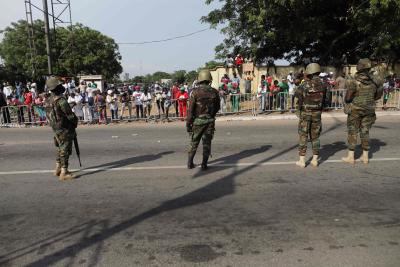
Critiques of military deployments
Military involvement during the 2020 elections raised several criticisms, from allegations of human rights violations to political intimidation and bias. Deploying Operation Conquered Fist as voter registration started was seen by the NDC, the main opposition party, and other smaller parties as an attempt to intimidate residents of border towns, especially in the Volta Region.
Their claims were dismissed by the defence minister as propaganda, but in several registration centres across the country there were reports of soldiers intimidating registrants. The timing of deployment and alleged interference in voter registration questioned the military’s image of professionalism and political neutrality.
Ahead of election day on 7 December, the armed forces reinforced its deployments across the country especially in what were defined as hotspots. The NDC claimed that the deployment was politically motivated, especially in the Volta Region as an NDC stronghold. Traditional leaders in the region were also critical and called for withdrawal of the forces.
The government, in turn, argued that the deployments took place to prevent terrorist attacks following secessionist attempts in the region. The credibility of the military was further challenged after their involvement in a shooting incident in the Techiman South Constituency. Clashes between NPP and NDC supporters caused two deaths and several injuries.
Compared to previous elections, and in neighbouring countries, Ghana’s presidential polls are considered to be one of the most peaceful.
Should the military be involved in elections security or not?
Some analysts argue that the Ghana Armed Forces should be kept out of elections to focus on protecting the state against external threats – also, or especially, during elections when the country is at its most vulnerable. Others suggest that the military can be part of election security provision, but only in cases when the police force is overwhelmed.
On a pragmatic note, the military in Ghana has a de facto important role to play during elections, directly and indirectly. The concern should therefore be how the Ghana Armed Forces is used during elections, not if. What is clear is that the military must be used sparingly, limited to complex security issues beyond the capabilities of the Ghana Police Service and to defend Ghana’s territorial integrity. Otherwise, the country risks drawing the military into partisan politics which will further undermine the trust, confidence and respect of the public that the Ghana Armed Forces still enjoys.
This policy brief is an output from the research programme Domestic Security Implications of Peacekeeping in Ghana (D-SIP), funded by the Danish Ministry of Foreign Affairs and supported by the Danish Fellowship Centre.
DIIS Experts

